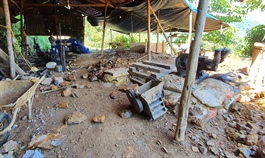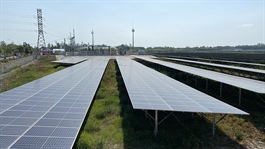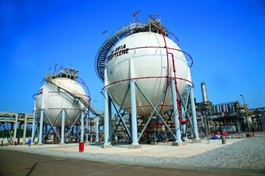Vietnam to name 7 state-owned enterprises as industry-leaders
Vietnam to name 7 state-owned enterprises as industry-leaders
As industry leaders, state enterprises are responsible for forming value chains and promoting innovation in their respective sectors by mobilizing the participation of enterprises from various economic components.
The Ministry of Planning and Investment (MPI) plans to include seven major state-owned enterprises (SOEs) with a combined total asset value of over VND20 trillion (US$870.6 million) to join the pilot project of developing large scale SOEs as industry-leading companies to support the overall growth of their respective sectors.

Overview of the meeting. Source: VGP
|
Minister of Planning and Investment Nguyen Chi Dung unveiled the plan at a meeting on March 10.
According to Dung, SOEs currently account for 0.07% of total number of operational enterprises in Vietnam, but make up 7% of total asset value, 10% of equity and 30% of the GDP, not to mention its contribution in terms of creating jobs, stabilizing the market, ensuring social welfare and defense-security.
“Privatization and state capital divestment at SOEs are the right move for them to focus on more challenging issues, and the rest is for the private sector,” Dung added.
As the country pushes to become a greater resilient and independent economy, enterprises should be able to develop and master core technologies, he stressed.
MPI’s initial proposal would include three corporations from hi-tech industrial sector (Viettel, VNPT and Mobifone), two from renewable energy (EVN and PVN), one in ocean freight and logistics (Saigon New Port), and one in finance-banking (Vietcombank).
The ministry also outlined five criteria to determine a large-scale SOE, including (1) registered capital of over VND1.8 trillion (US$77.4 million); (2) having potential to expand its market share (of at least 30%) to the extent of controlling the market ; (3) having efficient corporate governance model and high-level of technological application; (4) operating in fields with high spillover effects (excluding those under state monopoly), including economic infrastructure, industry, energy, finance, banking, among others; (5) wholly-owned or at least 50% stake owned by the state, especially firms owned by various shareholders.
Supporting policies not to disrupt market mechanism
Le Manh Hung, director general of MPI’s Enterprise Development Agency, said the main objective of the proposal is to create a platform to develop a handful of SOEs serving as industry leaders capable of connecting with the private sector to form new innovation supply chains and mastering core technologies.
“These enterprises should operate in new business lines to meet the development demand of the country in the new period. As an industry leader, they are responsible for forming value chains and promoting innovation with the participation of enterprises from various economic components,” Hung continued.
The ultimate goal would be to build an independent, self-sufficient and sustainable economy, Hung added.
Meanwhile, the proposal also stressed the importance of supporting policies to be in line with Vietnam’s orientation for socio-economic development and in compliance with its international commitment.
“Instead of creating disruption to market mechanism, the policies need to maintain a fair, transparent and competitive business environment,” added Hung.
As such, SOEs under the list would be given the opportunity to reform the current corporate governance to compete in a fair and square manner with other enterprises.
“SOEs are expected to have more freedom in making their business-related decisions, while the state would evaluate the overall performance efficiency based on financial criteria,” Hung noted.























